Dorylus (Anomma) gribodoi Emery
 Male Male   Type locality Togo
(Dorylus Gribodoi n. sp.,
Emery, 1892d: 570, illustrated, male) collected at Amu by Mr Gribodo
see http://www.antweb.org/specimen.do?name=casent0903706 Type locality Togo
(Dorylus Gribodoi n. sp.,
Emery, 1892d: 570, illustrated, male) collected at Amu by Mr Gribodo
see http://www.antweb.org/specimen.do?name=casent0903706
subspecies
confusus (Dorylus
Gribodoi Em. var. confusa
n. var., Santschi, 1915c: 246, male) from Ivory
Coast, collected at Grand Bassam, by Lohier - no images on Antweb (July 2014)
insularis
(Dorylus (Anomma) gribodi Em.
v. insularis n. v., Santschi,
1937b: 98, male) from Fernando Po I. - see http://www.antweb.org/specimenImages.do?name=casent0911292
revisions and
synonymy by Schöning et al. (2008)
junior synonyms (see lower page)
gerstaeckeri (Dorylus
gerstäckeri n. sp.,
Emery, 1895j: 713, illustrated, holotype major worker only) from Ghana - type worker below
lamottei (Dorylus
(Anomma) lamottei n. sp., Bernard, 1952: 219, illustrated,
workers)
from Guinea - type worker on linked page (see below)
all forms known  . .
|
My separation of the much redder form, with a more
bulbous head on the major, as a distinct species, Dorylus (Anomma)
quadratus (Santschi), has now (April,
2008) been confirmed by Schöning et al. (2008), although they
synonymized quadratus with Dorylus (Anomma) kohli.
Specimens that I recognise as kohli
are much darker red-brown.
|
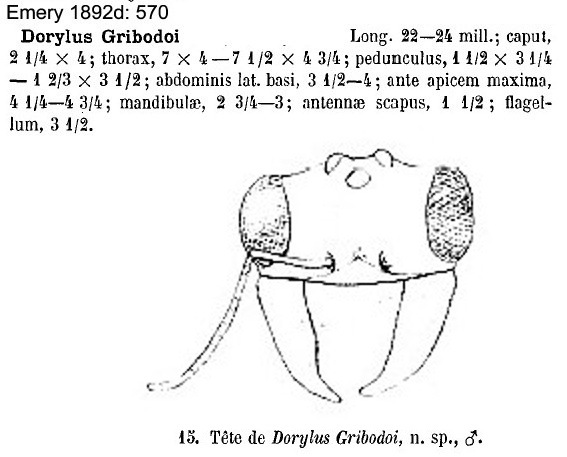 Emery's (1892d)
description, with a drawing of the male
head, is at Emery's (1892d)
description, with a drawing of the male
head, is at  . Emery (1895j) had a
brief description, with an illustration; this is at . Emery (1895j) had a
brief description, with an illustration; this is at  . Santschi's (1937b) description of insularis
is at . Santschi's (1937b) description of insularis
is at  . .
Santschi (1915c) described the male of variety confusa
as differing from the type in being darker, of uniform
dark ferruginous brown; in gribodoi the thoracic sutures and
the base of gastral segments has very distinct dark brown bands; in atratus
the colour is black. The specimens were from Ivory Coast, Grand
Bassam, by J.H. Lohier, 2 males, and from near Imbroko, by Posth, 1910,
3 males.
|
Schöning et al. (2008) synonymized D.
gerstaeckeri and lamottei under
Dorylus gribodoi, but they declined to separate it
as in Anomma or Dorylus - http://www.mapress.com/zootaxa/2008/f/zt01749p052.pdf.
Note that the single male and the workers were collected entirely
separately but have been linked by genetic methods.
|
Wheeler (1922) gave records of gribodoi from Liberia
(by
Keiselbach), Ivory Coast (by A. Richard, Lohier, and at
(D?)Imbroko by Posth), Ghana (no location), Nigeria (Lower
Benue, by Lenfant), Congo and Zaïre.
From Guinea, Bernard (1952), calling it a purely
western form, noted two typical males were taken from Mt. Nimba, one at
Yalanzou, the other at Camp IV, 1000 m.
|
 The photomontage is
of a male from Taï, Ivory Coast,
collected by Casper Schoning; collated from http://www.antweb.org/specimen.do?name=casent0172625 The photomontage is
of a male from Taï, Ivory Coast,
collected by Casper Schoning; collated from http://www.antweb.org/specimen.do?name=casent0172625
The holotype male can be seen at http://www.antweb.org/specimen.do?name=casent0903706
|
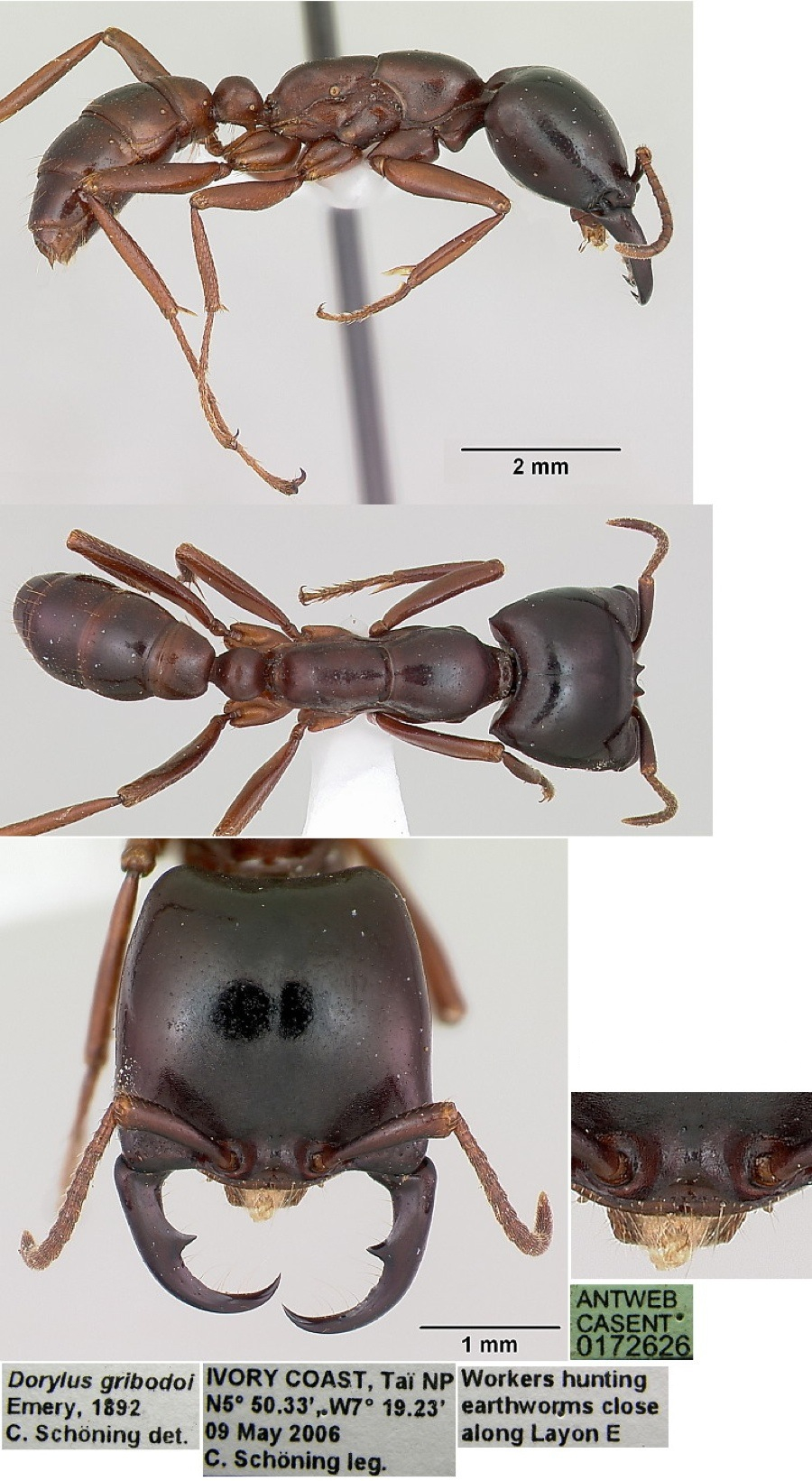 The photomontage is
of a specimen from Taï, Ivory Coast,
collected by Casper Schoning; collated from http://www.antweb.org/specimen.do?name=casent0172626&shot=p1&project=null The photomontage is
of a specimen from Taï, Ivory Coast,
collected by Casper Schoning; collated from http://www.antweb.org/specimen.do?name=casent0172626&shot=p1&project=null
|
Dorylus (Anomma) gerstaeckeri Emery
 Type locality Ghana (Dorylus gerstäckeri n. sp.,
Emery,
1895j: 713, illustrated, workers) from Accra Type locality Ghana (Dorylus gerstäckeri n. sp.,
Emery,
1895j: 713, illustrated, workers) from Accra  . .
|
|
 Emery's
(1895j) description is at Emery's
(1895j) description is at  . Emery's (1901c) description is at . Emery's (1901c) description is at  . .
The original description was of a single worker, TL 8.0;
but Emery (1901) received others from Cameroun which were
longer, TL 10 mm. These were characterised by a square head about 1/3
of TL; vertex shiny and puncturation sparse; petiole slightly wider
than long; overall body stocky (stockier than burmeisteri) and
appendages shorter. Light brick-red, antennae ands legs yellowish, the
head dunkel = darker or
duller rust, the occiput darker
|
|
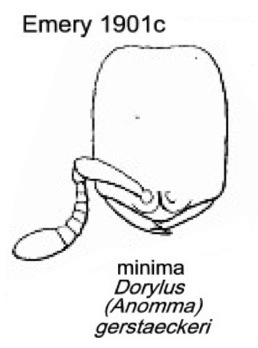 Raignier & van
Boven (1955) under Dorylus
(Anomma) emeryi
note comparison with gerstaeckeri; emeryi being bigger
TL 12.7 mm; head rectangular, slightly longer than wide, and slightly
more than 1/3 of TL (in gerstaeckeri it is slightly less than
1/3). Raignier & van
Boven (1955) under Dorylus
(Anomma) emeryi
note comparison with gerstaeckeri; emeryi being bigger
TL 12.7 mm; head rectangular, slightly longer than wide, and slightly
more than 1/3 of TL (in gerstaeckeri it is slightly less than
1/3).
The Ghana record was from Aburi (F. Silvestri,
in Wheeler, 1922). One of the two species studied in Ghana during 1971
by Gotwald (1974). He found it only in the high forest areas,
especially in and around cocoa at CRIG, where the almost exclusive prey
was earthworms.
Also from Cameroun by Conradt (in Wheeler, 1922).
Specimens from Cameroun (Fotso Kuate) are shown in
detail on Dorylus
(Anomma) gerstaeckeri page. Those match the Emery (1895j)
description in form and colour, and are noticeably duller than
the Schoning (Antweb) illustration; they are similar to the type gerstaeckeri but the form of the
mandible suggests that morph for morph they are larger.
|
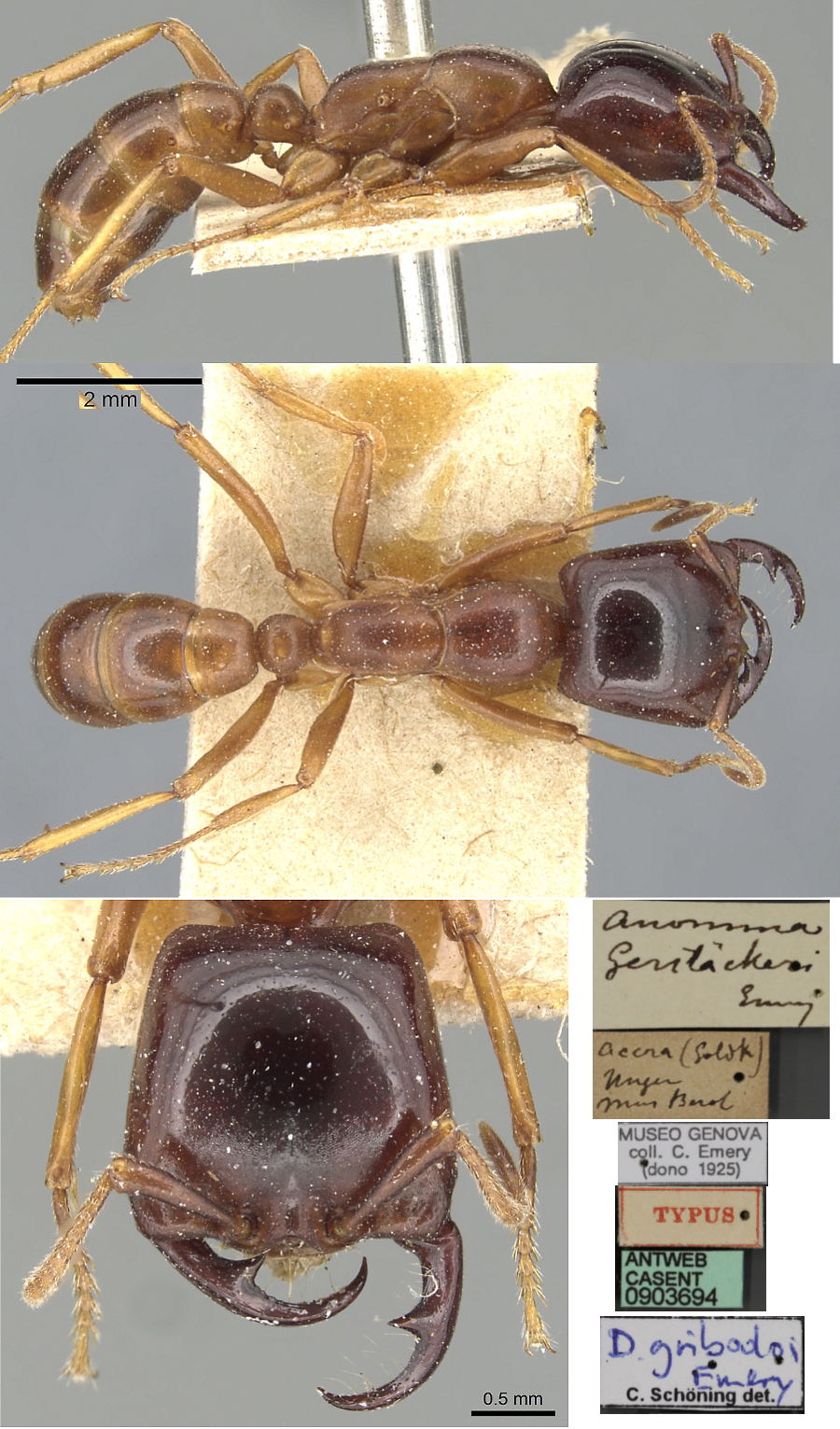 The
photomontage is of a gerstaeckeri type worker collated
from http://www.antweb.org/specimen.do?name=casent0903694 The
photomontage is of a gerstaeckeri type worker collated
from http://www.antweb.org/specimen.do?name=casent0903694
The holotype male can be seen at http://www.antweb.org/specimen.do?name=casent0903706
|
Oxford University Museum
specimens
Dorylus (Anomma) gribodoi
B Taylor det.
(as lamottei)
|
Guinea
T Humle
Humle 01
|
20.ix.2001
Bossou
7°39'57 N
8°25'08 W
|
|
2
|
 |
Dorylus (Anomma) gribodoi
B Taylor det.
(as lamottei) |
Guinea
T Humle
Humle 05
|
8.ix.2001
Bossou
7°39'57 N
8°25'08 W
|
|
1
|
 |
Dorylus (Anomma) gribodoi
B Taylor det. |
Benin
J-F Vayssieres
RVA 3052
|
20.iii.2013
Koro
09°22'21'' N
02°40'13'' E
|
Mangifera indica orchard
prey of Oecophylla longinoda
1300-1400 h
major
|
1
|
 |
Dorylus (Anomma) gribodoi
B Taylor det.
|
Cameroun
A Fotso Kuate
Dorylus sp1
|
17.v.2007
Matomb
03°54'30" N
11°25'58" E
|
Tuna bait in mixed
crop fields
|
3
|
 |
|
Dorylus (Anomma) lamottei Bernard
 Type locality Guinea
(Dorylus
(Anomma) lamottei n. sp., Bernard, 1953b: 219, illustrated) from
Mt. Nimba, 12 workers; 3 minors
from Mount Tô; 4 medium workers, Nion crest, forest, 1300 m; 5 medium
workers, Camp I, all collected by Lamotte; worker only known (see
Bolton, 1995) Type locality Guinea
(Dorylus
(Anomma) lamottei n. sp., Bernard, 1953b: 219, illustrated) from
Mt. Nimba, 12 workers; 3 minors
from Mount Tô; 4 medium workers, Nion crest, forest, 1300 m; 5 medium
workers, Camp I, all collected by Lamotte; worker only known (see
Bolton, 1995)  . .
|
|
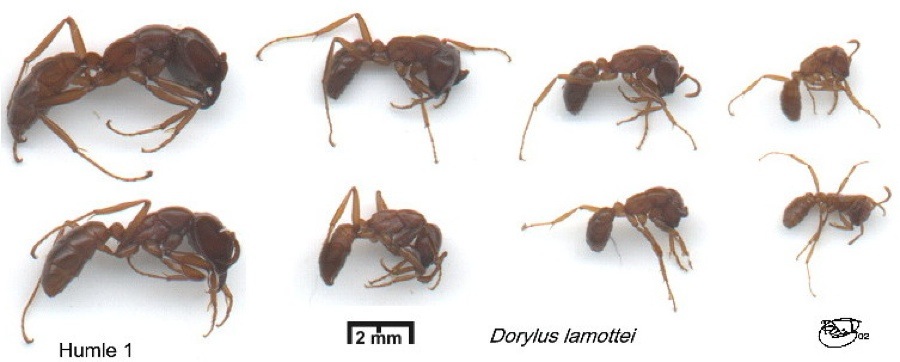 Polymorphism
- the photomontages are of specimens
collected at Bossou, south eastern Guinea by Tatyana Humle
(Humle 1, 20.ix.2001, and Humle 5, 8.ix.2001). The ant colonies were
was observed as eaten by chimpanzees using the "ant-dipping" (using
tools to gather the ants). The characters are quite distinctive,
notably the short, near globose petiole with a spike-like subpetiolar
process; the lighter colour and smaller size also seem consistent. See
also the polymorphism montage at the bottom. It seems the species may
be restricted to the Mt. Nimba massif and surrounding areas. Polymorphism
- the photomontages are of specimens
collected at Bossou, south eastern Guinea by Tatyana Humle
(Humle 1, 20.ix.2001, and Humle 5, 8.ix.2001). The ant colonies were
was observed as eaten by chimpanzees using the "ant-dipping" (using
tools to gather the ants). The characters are quite distinctive,
notably the short, near globose petiole with a spike-like subpetiolar
process; the lighter colour and smaller size also seem consistent. See
also the polymorphism montage at the bottom. It seems the species may
be restricted to the Mt. Nimba massif and surrounding areas.
The various morphs are shown in detail on Dorylus
(Anomma) lamottei morphs page.
|
|